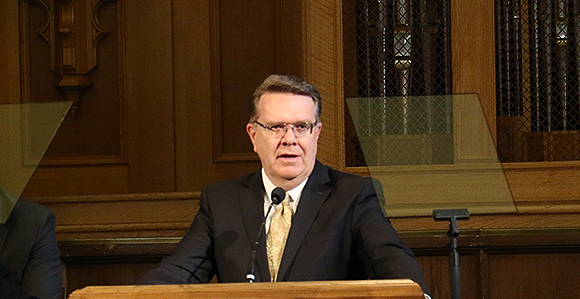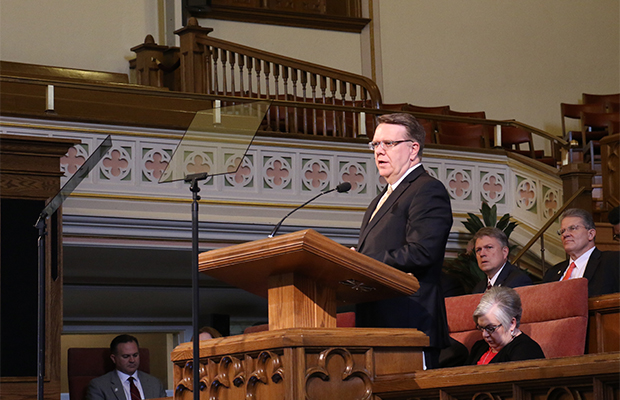Seventy Identifies Four Steps for Pondering That Can Lead to Personal Revelation
Contributed By Valerie Johnson, Church News contributor

Elder Scott D. Whiting, General Authority Seventy, speaks to LDS Business College students at a devotional in the Assembly Hall on Temple Square on November 7, 2017.
Article Highlights
- Pondering requires active focus, discipline, persistence, and practice.
- The perfect place to begin pondering is during the sacrament.
- As we ponder what we have learned, the Lord gives us more knowledge.
“I have learned that pondering is an active process that requires discipline, focus, and persistence.” —Elder Scott D. Whiting, General Authority Seventy
Related Links
Elder Scott D. Whiting, General Authority Seventy, taught LDS Business College students that pondering can lead to revelation during a devotional held in the Assembly Hall on November 7.
“Pondering is a spiritual principle that is often spoken of in scripture and by prophets, seers, and revelators, but I have learned that not many of us know how to ponder or how to do so with the degree of effectiveness that will unlock the desired results,” Elder Whiting said.
“From my own experience, I have learned that pondering is an active process that requires discipline, focus, and persistence. Learning to ponder requires practice, and through practice, you can come to learn of the power that comes from pondering.”
Elder Whiting shared examples of pondering found in the scriptures, such as the revelation President Joseph F. Smith received that comprises Doctrine and Covenants 138. From these scriptures, Elder Whiting identified four steps in the process of pondering.
Four steps in pondering process
1. Prepare a quiet place free from distractions.
By sitting in his room, away from distractions, President Smith created a “sacred space where he could think deeply about sacred things,” Elder Whiting said. Nephi, too, “sat pondering” before he saw the vision of Lehi’s dream.
2. Read scriptures with the desire to learn from them, rather than to just finish, by thinking deeply about what we are reading.
Involving scripture in the process of pondering is a crucial step, Elder Whiting said. “From personal experience, I know that my learning from the scriptures is greatly enhanced if I slow down and think deeply upon what I’m reading. As an example, when I read the Book of Mormon, I like to ask myself questions as I’m reading,” he said. He even likes to insert himself into the stories of the Book of Mormon to liken them unto him.
3. Reflect upon what we have read and think about it again and again.
President Smith reflected on the teachings and doctrines of God—in particular, the Atonement of Jesus Christ. Because he did so, he was able to receive revelation. Elder Whiting also told how when Joseph Smith was a young boy, he reflected on the powerful words in James 1:5 again and again.
“Perhaps you can begin to practice pondering during your weekly sacrament meetings when you will sit in a room and hear scripture in the form of the prayers offered over the emblematic bread and water, and then reflect upon the atoning sacrifice of Jesus Christ,” Elder Whiting suggested. “Learning to develop the gift of pondering will truly enhance your Sabbath day experience and bring deeper meaning to the sacred ordinance of the sacrament.”
4. Engage our minds in an active process.
In President Smith’s pondering, his mind reverted or returned to the writings of Peter, Elder Whiting said. “As we learn to effectively ponder, we will often times be directed to other doctrines and principles that build upon each other. This is part of learning ‘line upon line, precept upon precept,’ which is spoken of so many times in the scriptures. It is through this process that we bring the gospel of Jesus Christ more deeply into our hearts, thereby deepening our conversion.”
Pondering leads to revelation
The power that comes from pondering is the power to receive revelation, Elder Whiting said.
He shared the example of President Smith’s vision “concerning the Savior’s visit to the spirits of the dead while His body was yet in the tomb,” which came at a time of great suffering and death in the world.
Nephi, who had been pondering over his father’s dream, not only saw it for himself, but learned the meaning of the symbolic elements in the dream. “He was also shown the condescension of God the Father and God the Son through the birth of Jesus Christ to a ‘virgin [who was] exceedingly fair’” (1 Nephi 11:13), as well as many other things, Elder Whiting said.
“My dear brothers and sisters, while these are examples of prophets, please know that the same power of revelation is available to you,” Elder Whiting said. “You truly can draw upon the powers of heaven.”
With all the important life decisions ahead, “surely you feel the need for personal revelation,” he said. “You may not be given a vision of the eternities, but you will have the Holy Ghost speak peace to your mind, or cause that your bosom shall burn within you. As you learn to ponder over sacred things, you will have your heart and mind open to greater truths of the gospel. It will take practice and patience, but I can bear personal witness that pondering will lead to revelation.”

Elder Scott D. Whiting, General Authority Seventy, speaks to LDS Business College students at a devotional in the Assembly Hall on Temple Square on November 7, 2017. Photo by Valerie Johnson.

Elder Scott D. Whiting, General Authority Seventy, speaks to LDS Business College students at a devotional in the Assembly Hall on Temple Square on November 7, 2017. Photo by Valerie Johnson.

LDS Business College students enter the Assembly Hall on Temple Square for a devotional on November 7, 2017. Photo by Valerie Johnson.
